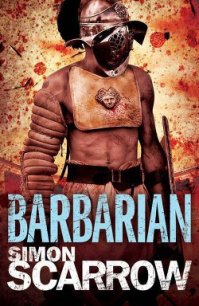Sword and Scimitar - Scarrow Simon (читать книги онлайн бесплатно серию книг txt) 📗
At first Thomas, Richard and Sir Martin had been assigned to training the Maltese militiamen in the most basic of fighting skills. It had long been the policy of the Order to discourage the islanders from using weapons out of fear that the local people might be emboldened to rebel against the Order of knights that had been imposed on them. As a result the majority of them were strangers to swords, pikes and arquebuses and only a handful had ever worn any armour. There were some who had been selected to serve as soldiers of the Order and these assisted with the training and translated the commands into the local tongue that sounded more like Arabic than any European language to an unfamiliar ear. Indeed, the islanders, with their dark features and skin, looked more like Moors and Turks than Christians. Yet they were fanatic in their loyalty to the Church of Rome and hatred of the enemy who been preying on the Maltese for over a hundred years. They were keen to learn and were soon handling their weapons like experienced soldiers. Thomas had insisted that they should also be taught to use the arquebus, but such was the shortage of gunpowder that only three live firings were permitted once the militiamen had learned how to load the weapons.
Once the hurried training was complete, the English knights and their squires were allocated to the work party under Colonel Mas, one of the mercenaries recruited by the Grand Master. They were tasked with constructing the ravelin and rose at dawn to take a hurried breakfast before heading through the narrow streets to the quay. There they waited with the other soldiers and civilians for places on the boats ferrying the workers across the harbour to the landing stage below the fort. Outside the wall they were issued with picks and joined the slaves already at work cutting a ditch into the rock in front of the ravelin.
For most of the morning they worked in the shade, but as the rays of the sun reached down into the ditch, the heat added to the discomfort of the constant chinking of the picks, the swirling dust and the ache of tired limbs. The glare of the sun was harsh enough to make the men squint, and it steadily burned exposed skin as the workers swung their picks under the burden of their sweat-soaked tunics. At noon they climbed out of the ditch and slumped in the shade of the awnings. They took their midday meal from the boys who had emerged from the fort carrying pitchers of watered wine and baskets of bread and roundels of a hard goat’s cheese made locally. These were handed to the soldiers and the Maltese while the slaves sat in the open and were fed warm gruel from a tureen, one ladle per man, slopped into battered leather cups. These were thrust into the soiled hands of each slave and, still chained in pairs, they squatted down to savour the paltry rations that kept them alive and able to work, and no more. They were barefoot and dressed in rags stained with their own filth. Unkempt hair hung in knotted locks about their bearded faces and their features were gaunt.
On the first day Richard had regarded the slaves with abject pity and when they had settled to eat he chewed slowly at his bread for a while before he spoke to Thomas.
‘Those slaves, they look more like animals than men.’
Sir Martin chuckled as he chewed on a strip of salted beef. He swallowed and cleared his throat. ‘They’re worse than animals, young Dick.’
He spoke loudly so that the nearest of the slaves would hear him. One of them, fairer skinned than the others, looked up at the insult and glared fiercely from beneath his matted locks of dust-grey hair but kept his silence.
‘They’re still humans,’ said Richard.
Sir Martin shrugged. ‘Whatever they are, they’re the enemy, the enemy of our faith, and they would slaughter us without mercy had they the chance. And you, Dick, are a squire and you will treat me with due deference.’
‘I am Sir Thomas’s squire,’ Richard replied.
‘That is as may be, but you still call me “sir” when you address me.’ Sir Martin turned to Thomas. ‘You need to tame your squire, he lacks the necessary humility.’
Richard glanced at Thomas and the knight sighed.
‘He’s right, Richard. Remember your place and act accordingly. Else I will not be so tolerant. Understood?’
The squire nodded reluctandy.
‘That said, a knight is required to show charity, even to his enemies.’ Thomas rose stiffly and walked over to the nearest pair of slaves and stood over them. ‘You understand some of our tongue, I think.’
The Muslim who had reacted to Sir Martin’s insult looked up warily and then nodded.
Thomas held out the remains of the bread he had been eating. ‘Here. Take it.’
The slave stared at the bread and chewed his chapped lips. Then, hesitantly, he reached a hand out and delicately plucked the hunk from Thomas’s fingers. At once he began to tear at it, watching Thomas anxiously as if the knight might snatch the bread back without warning. The slave chained to him was a thin dark-skinned Moor who seemed to be in pain as his companion fed, and he began to make a pitiful keening noise. The other man paused for a moment and then tore what was left in half and gave a piece to his companion. The act surprised Thomas who had often witnessed the selfish levels to which slaves were driven by the need to survive. Compassion was a weakness that could kill a man.
‘I gave you the bread, not him. Why did you share it?’
The slave looked up. ‘Because I chose to . . . master. That is one freedom I still have.’
His accent was familiar and Thomas was curious to discover more about a slave who spoke like a native of England yet was a Muslim slave.
‘Where are you from?’
‘Tripoli, master. I was the bodyguard of a merchant, until his ship was captured by one of your galleys.’
‘And how does a slave from Tripoli come to speak English?’
‘I was born in Devon, master. On the coast.’
‘Devon?’ Thomas raised his eyebrows. ‘Then what the devil are you doing here?’
The slave lowered his gaze as he spoke. ‘I was nine when a corsair ship raided our village, master. They killed my father and several other men, and took the women and children to sell in the slave market at Algiers. I never saw my mother again. I was kept by the corsair captain. He raised me, trained me to fight and then sold me to the merchant.’
‘And converted you to Islam?’
The slave nodded. ‘It is my faith.’
Sir Martin spat with disgust. ‘A traitor to your own kind is what you are!’
The slave flinched and seemed to shrink under the harsh rebuke.
Thomas squatted down in front of him. ‘What is your name?’
‘Abdul, master.’
‘I meant your real name. Your Christian name?’
‘My name is Abdul,’ the slave said firmly. ‘Abdul-Ghafur. I am no Christian. I am a Muslim.’
Thomas met his gaze and for a moment the slave stared back as a man, defiant and proud, before he wavered and slumped back into himself.
‘Is there no part of you that remains from your previous life? After all, you still speak your mother tongue.’
The slave shrugged his bony shoulders. ‘There are memories, but that was another life. Before I was shown the truth through the teachings of Mohammed, peace be upon him.’
‘And yet this is the reward won by your faith.’ Thomas gestured at the other wretched creatures hunched nearby. ‘You have become a slave. Renounce Islam and you could be free, and return to your home in Devon.’
‘There is no home for me there. The boy I was then is no more, Hospitaller. I am now Abdul. In due course I will be the master and you will be the slave. Then perhaps I might return your kindness and offer you a crust.’
Thomas smiled mildly. ‘You think that the Sultan will take this island?’
‘How can he not? He has God on his side. The faith of his soldiers is stronger than yours, and those who fight with you. The outcome is certain and only a fool would doubt it. I, and the other Muslim slaves, will be set free. Those Christians who still live will be put in chains and sold in the markets of the Sultan. The leader of your Order will be executed and his head will be thrust upon a spear and mounted high enough for all in Istanbul to see and know that God is great.’ The slave’s eyes glittered with fanaticism as he spoke and there was a harsh, cruel edge to his voice. Then his expression softened and he addressed Thomas earnestly.




